Unit 5 Grammar Focus课件 (人教新目标七年级上册Unit 5 Do you have a soccer ball )
文档属性
| 名称 | Unit 5 Grammar Focus课件 (人教新目标七年级上册Unit 5 Do you have a soccer ball ) |
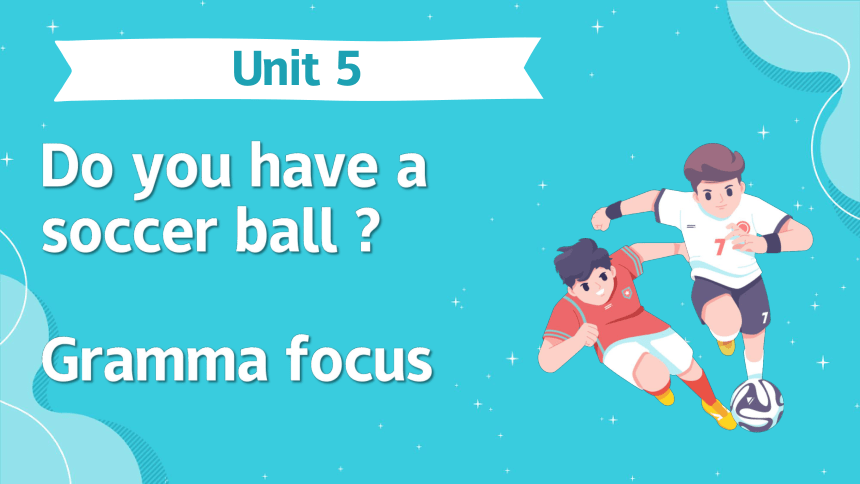
|
|
| 格式 | pptx | ||
| 文件大小 | 22.8MB | ||
| 资源类型 | 试卷 | ||
| 版本资源 | 人教新目标(Go for it)版 | ||
| 科目 | 英语 | ||
| 更新时间 | 2023-11-04 19:49:29 | ||
图片预览

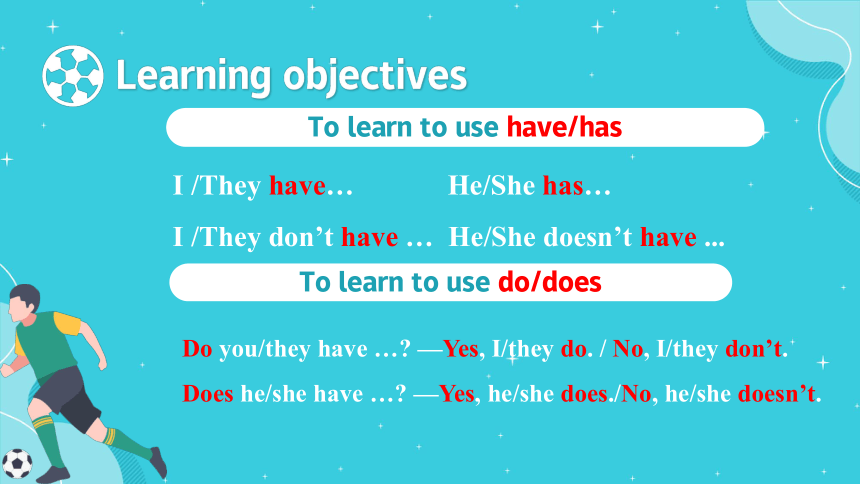

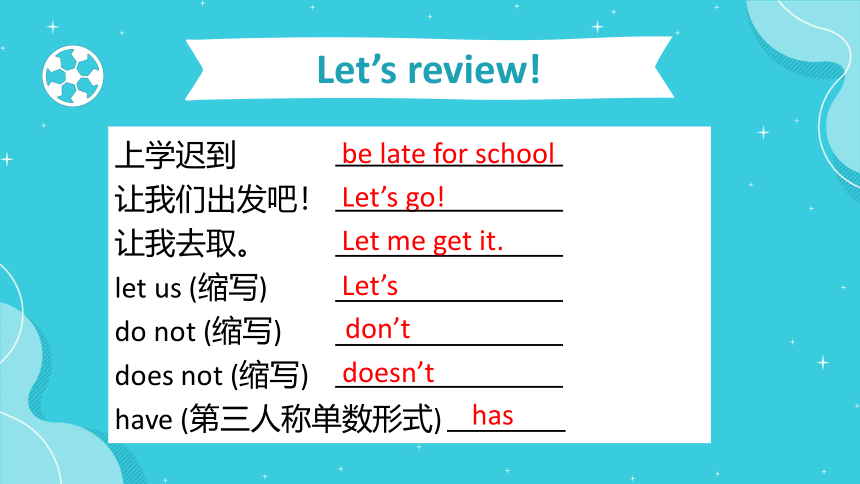
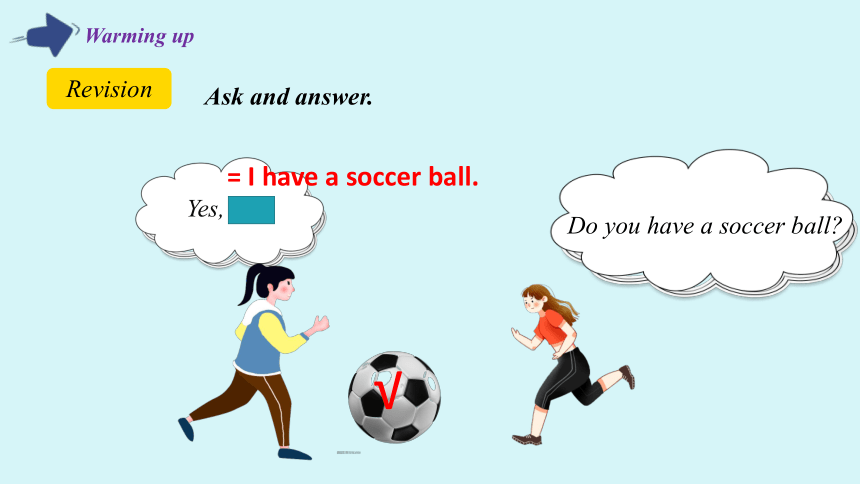
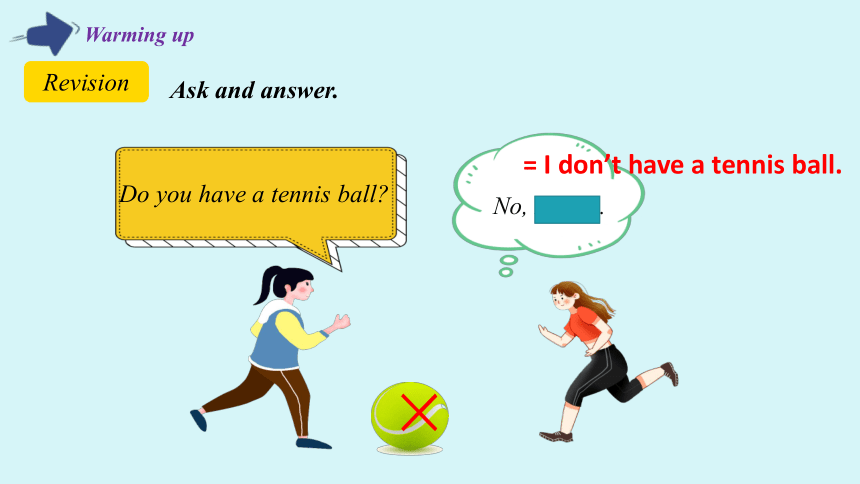
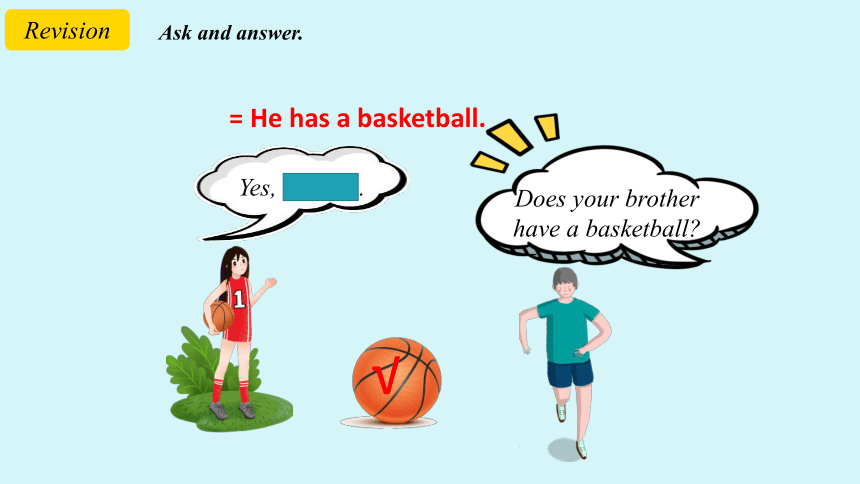
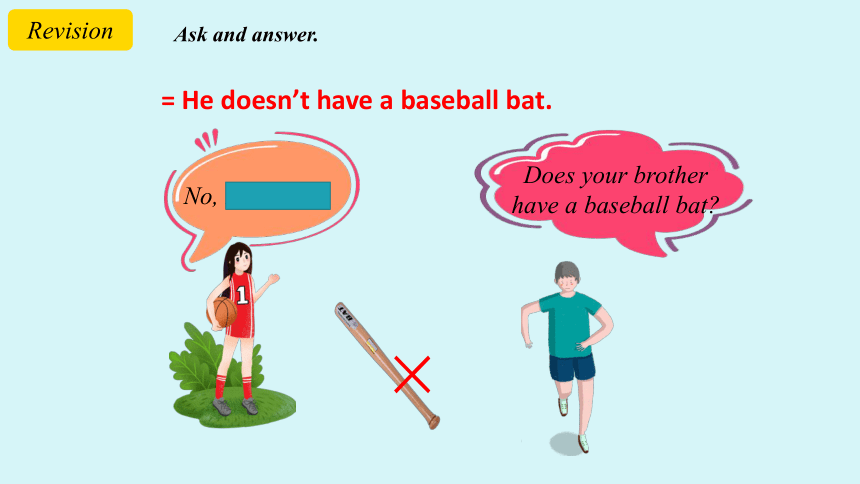

文档简介
(共27张PPT)
Do you have a soccer ball
Gramma focus
Unit 5
I /They have… He/She has…
I /They don’t have … He/She doesn’t have ...
Do you/they have … —Yes, I/they do. / No, I/they don’t.
Does he/she have … —Yes, he/she does./No, he/she doesn’t.
To learn to use have/has
To learn to use do/does
Learning objectives
Let’s review!
Let’s review!
上学迟到
让我们出发吧!
让我去取。
let us (缩写)
do not (缩写)
does not (缩写)
have (第三人称单数形式)
be late for school
Let’s go!
Let me get it.
Let’s
don’t
doesn’t
has
Warming up
Revision
Ask and answer.
Do you have a soccer ball
Yes, I do.
= I have a soccer ball.
√
Warming up
Revision
Ask and answer.
Do you have a tennis ball
No, I don't.
×
= I don’t have a tennis ball.
Revision
Ask and answer.
Does your brother have a basketball
Yes, he does.
√
= He has a basketball.
Revision
Ask and answer.
Does your brother have a baseball bat
No, he doesn't.
×
= He doesn’t have a baseball bat.
实义动词 have
实义动词:有实际意思的动词,如eat, play, like等
有实义动词的句子变否定或疑问句时,要借助助动词do/does
I have a volleyball.
I have a ping-pong ball.
She has a baseball.
He has two ping-pong bats.
They have a volleyball.
I don’t have a volleyball.
I don’t have a ping-pong ball.
She doesn’t have a baseball.
He doesn’t have two ping-pong bats.
They don’t have a volleyball.
助动词do,does协助动词have构成否定句。
第一人称
第三人称单数
第三人称复数
肯定句
否定句
肯定句:主语+have/ has+宾语
否定句:主语+don’t/ doesn’t +have+宾语
把肯定句改为否定句,否定句改为肯定句
1. They have a basketball. ____________________________
2. Mike has a baseball. ______________________________
3. The monkey has three bananas.
____________________________________
4. I don’t have a soccer ball.______________________
5. She doesn’t have a volleyball.____________________
They don't have a basketball.
Mike doesn’t have a basketball.
The monkey doesn’t have three bananas.
I have a soccer ball.
She has a volleyball.
Grammar Focus
Do you have a baseball
Do you have a ping-pong bat
Does she have a tennis ball
Does he have a soccer ball
Do they have a basketball
第二人称
第三人称单数
第三人称复数
Yes, I do./No, I don't.
Yes, I do./No, I don't.
Yes, she does./No, she doesn't.
Yes, he does./No, he doesn't.
Yes, they do./No, they don't.
第一、第二人称单复数, 以及第三人称复数作主语时, 用do构成一般疑问句, 回答用do或don’t。
第三人称单数作主语时, 用does构成一般疑问句, 回答用does或doesn’t。
助动词do,does协助动词have构成一般疑问句。
Let’s learn
数 人称 汉语 主格 助动词
单数 第一人称 我 I
第二人称 你 you 第三人称 他 he
她 she 它 it 复数 第一人称 我们 we
第二人称 你们 you 第三人称 他/她/它们 they do
does
do
英语句子里的人称和数
单数名词:Jerry,Mike,book,pen
My father doesn't have a car.
我爸爸没有小汽车。
Does the dog have a name
这条狗有名字吗?
I he they you
we she it Eric
do does
Write each word in the correct place in the chart.
I
he
they
you
we
she
it
Eric
Grammar Focus
Do you have a baseball
Do you have a ping-pong bat
Does she have a tennis ball
Does he have a soccer ball
Do they have a basketball
Do/Does+主语+动词原形+宾语
Yes, I do./No, I don't.
Yes, I do./No, I don't.
Yes, she does./No, she doesn't.
Yes, he does./No, he doesn't.
Yes, they do./No, they don't.
肯定回答: -Yes,主语+do/does.
否定回答:-No,主语+don’t/doesn’t. don’t= do not
doesn’t=does not
Presentation
Fill in the blanks with do or does. Then practice the conversations with your partner.
3b
A: _____ you have a baseball
B: Yes, I ____.
A: Great! I have a bat. Let’s play!
Do
do
A: ______ John have a soccer ball
B: No, he ________.
A: ______ he have a ping-pong bat
B: Yes, he ______. I think he has
ping-pong ball, too.
A: Hmm… let’s ask.
Does
doesn’t
Does
does
A: _____ your friends have
a basketball
B: Yes, they ____. They
have two basketballs.
A: Well, let’s play basketball.
B: That sounds good.
Do
do
那听起来不错。
主语+系动词+表语
用have,has,do,does,don't或doesn't填空。
1.I ________ a book and he ________ a pen.
2.They _______a color TV. They ________ have a radio.
3.She _______a CD player. It's on the desk.
4.I ________ have a computer,but Tom ________ one.
5.—Does he ________ a clock —No,he ________.
6.—Do you ________ a backpack —Yes,I ________.
7.—Does Cindy ________ a ruler —Yes,she ________.
have
have
has
has
has
don’t
don’t
have
have
have
doesn’t
does
do
have
a velleyball.
I
Do you
has
a velleyball.
She
Does she
当主语是第三人称单数时,助动词用does
主语是非第三人称单数时,助动词用do。
have
a velleyball
have
a velleyball
陈述句变一般疑问句
一般现在时陈述句变一般疑问句
“一加二变三问号”
一加:在主语的前面加do/does(第三人称单数)。
二变:句中的主语若含有I(my/we)等第一人称代词时,需将它们变为you(your/you)等第二人称代词。
动词变为原形
三问号:句末的句号改为问号。
把下列句子改为一般疑问句
1. They have a basketball. ____________________________
2. Mike has a baseball. ______________________________
3. The monkey has three bananas.
____________________________________
Do they have a basketball
Does Mike have a basketball
Does the monkey have three bananas.
根据汉语提示完成句子,每空一词。
8.海伦没有白色的夹克衫。
Helen ________ ________ a white jacket.
9.布朗夫人只有一个女儿,没有儿子。
Mrs. Brown only ________ a _________. She ________ ________ a son.
10.郑凯有兄弟姐妹吗?
________ Zheng Kai ________ sisters or ______
have
doesn’t
has
daughter
doesn’t
have
Does
have
brother
句型转换
1. I have a baseball bat. (改为一般疑问句)
_______ _______ _______ a baseball bat
2. My brother has a soccer ball. (改为一般疑问句)
_____ your brother ______ a soccer ball
3. Do your friends have a volleyball (作肯定回答)
_______, _______ ____.
4. Does Mr. Smith have a brother (作否定回答)
______, _____ _______.
5. My hat is on the chair. (对划线部分提问)
_______ ______ _____ hat
Do you have
Does have
Yes they do
No they don’t
Where is my
按要求完成下列句子.
11.I have a red notebook. (改为一般疑问句)
_________________________________
12.Her brother has a soccer ball. (改为否定句)
_________________________________
13.Does he have a ping-pong bat?(作否定问答)
_________________________________
14.Her aunt has four basketballs. (改为一般疑问句)
_________________________________
Do you have a red notebook
Her brther doesn’t have a soccer ball.
Yes, he does.
Does her aunt have four basketball
Remember the things in Bob’s room. Then close your books and ask and answer questions with a partner.
A: Does Bob have a soccer ball
B: Yes, he does.
Do you have a baseball
Yes, I do./No, I don't. I have a volleyball.
Do you have a ping-pong bat
Yes, I do./No, I don't. I have a ping-pong ball.
Does she have a tennis ball
Yes, she does /No, she doesn't. She has a baseball.
Does he have a soccer ball
Yes, he does./No, he doesn't. He has two ping-pong bats.
Do they have a basketball
Yes, they do./No, they don't. They have a volleyball.
Show Time
(1) 肯定句:
(2) 否定句:
(3) 一般疑问句:
肯定回答:
否定回答:
主语+have/ has+宾语.
主语+don’t/ doesn’t +have+宾语.
Do/ Does +主语+have+宾语
No, 主语+don’t/ doesn’t.
Yes, 主语+do/ does.
Do you have a soccer ball
Gramma focus
Unit 5
I /They have… He/She has…
I /They don’t have … He/She doesn’t have ...
Do you/they have … —Yes, I/they do. / No, I/they don’t.
Does he/she have … —Yes, he/she does./No, he/she doesn’t.
To learn to use have/has
To learn to use do/does
Learning objectives
Let’s review!
Let’s review!
上学迟到
让我们出发吧!
让我去取。
let us (缩写)
do not (缩写)
does not (缩写)
have (第三人称单数形式)
be late for school
Let’s go!
Let me get it.
Let’s
don’t
doesn’t
has
Warming up
Revision
Ask and answer.
Do you have a soccer ball
Yes, I do.
= I have a soccer ball.
√
Warming up
Revision
Ask and answer.
Do you have a tennis ball
No, I don't.
×
= I don’t have a tennis ball.
Revision
Ask and answer.
Does your brother have a basketball
Yes, he does.
√
= He has a basketball.
Revision
Ask and answer.
Does your brother have a baseball bat
No, he doesn't.
×
= He doesn’t have a baseball bat.
实义动词 have
实义动词:有实际意思的动词,如eat, play, like等
有实义动词的句子变否定或疑问句时,要借助助动词do/does
I have a volleyball.
I have a ping-pong ball.
She has a baseball.
He has two ping-pong bats.
They have a volleyball.
I don’t have a volleyball.
I don’t have a ping-pong ball.
She doesn’t have a baseball.
He doesn’t have two ping-pong bats.
They don’t have a volleyball.
助动词do,does协助动词have构成否定句。
第一人称
第三人称单数
第三人称复数
肯定句
否定句
肯定句:主语+have/ has+宾语
否定句:主语+don’t/ doesn’t +have+宾语
把肯定句改为否定句,否定句改为肯定句
1. They have a basketball. ____________________________
2. Mike has a baseball. ______________________________
3. The monkey has three bananas.
____________________________________
4. I don’t have a soccer ball.______________________
5. She doesn’t have a volleyball.____________________
They don't have a basketball.
Mike doesn’t have a basketball.
The monkey doesn’t have three bananas.
I have a soccer ball.
She has a volleyball.
Grammar Focus
Do you have a baseball
Do you have a ping-pong bat
Does she have a tennis ball
Does he have a soccer ball
Do they have a basketball
第二人称
第三人称单数
第三人称复数
Yes, I do./No, I don't.
Yes, I do./No, I don't.
Yes, she does./No, she doesn't.
Yes, he does./No, he doesn't.
Yes, they do./No, they don't.
第一、第二人称单复数, 以及第三人称复数作主语时, 用do构成一般疑问句, 回答用do或don’t。
第三人称单数作主语时, 用does构成一般疑问句, 回答用does或doesn’t。
助动词do,does协助动词have构成一般疑问句。
Let’s learn
数 人称 汉语 主格 助动词
单数 第一人称 我 I
第二人称 你 you 第三人称 他 he
她 she 它 it 复数 第一人称 我们 we
第二人称 你们 you 第三人称 他/她/它们 they do
does
do
英语句子里的人称和数
单数名词:Jerry,Mike,book,pen
My father doesn't have a car.
我爸爸没有小汽车。
Does the dog have a name
这条狗有名字吗?
I he they you
we she it Eric
do does
Write each word in the correct place in the chart.
I
he
they
you
we
she
it
Eric
Grammar Focus
Do you have a baseball
Do you have a ping-pong bat
Does she have a tennis ball
Does he have a soccer ball
Do they have a basketball
Do/Does+主语+动词原形+宾语
Yes, I do./No, I don't.
Yes, I do./No, I don't.
Yes, she does./No, she doesn't.
Yes, he does./No, he doesn't.
Yes, they do./No, they don't.
肯定回答: -Yes,主语+do/does.
否定回答:-No,主语+don’t/doesn’t. don’t= do not
doesn’t=does not
Presentation
Fill in the blanks with do or does. Then practice the conversations with your partner.
3b
A: _____ you have a baseball
B: Yes, I ____.
A: Great! I have a bat. Let’s play!
Do
do
A: ______ John have a soccer ball
B: No, he ________.
A: ______ he have a ping-pong bat
B: Yes, he ______. I think he has
ping-pong ball, too.
A: Hmm… let’s ask.
Does
doesn’t
Does
does
A: _____ your friends have
a basketball
B: Yes, they ____. They
have two basketballs.
A: Well, let’s play basketball.
B: That sounds good.
Do
do
那听起来不错。
主语+系动词+表语
用have,has,do,does,don't或doesn't填空。
1.I ________ a book and he ________ a pen.
2.They _______a color TV. They ________ have a radio.
3.She _______a CD player. It's on the desk.
4.I ________ have a computer,but Tom ________ one.
5.—Does he ________ a clock —No,he ________.
6.—Do you ________ a backpack —Yes,I ________.
7.—Does Cindy ________ a ruler —Yes,she ________.
have
have
has
has
has
don’t
don’t
have
have
have
doesn’t
does
do
have
a velleyball.
I
Do you
has
a velleyball.
She
Does she
当主语是第三人称单数时,助动词用does
主语是非第三人称单数时,助动词用do。
have
a velleyball
have
a velleyball
陈述句变一般疑问句
一般现在时陈述句变一般疑问句
“一加二变三问号”
一加:在主语的前面加do/does(第三人称单数)。
二变:句中的主语若含有I(my/we)等第一人称代词时,需将它们变为you(your/you)等第二人称代词。
动词变为原形
三问号:句末的句号改为问号。
把下列句子改为一般疑问句
1. They have a basketball. ____________________________
2. Mike has a baseball. ______________________________
3. The monkey has three bananas.
____________________________________
Do they have a basketball
Does Mike have a basketball
Does the monkey have three bananas.
根据汉语提示完成句子,每空一词。
8.海伦没有白色的夹克衫。
Helen ________ ________ a white jacket.
9.布朗夫人只有一个女儿,没有儿子。
Mrs. Brown only ________ a _________. She ________ ________ a son.
10.郑凯有兄弟姐妹吗?
________ Zheng Kai ________ sisters or ______
have
doesn’t
has
daughter
doesn’t
have
Does
have
brother
句型转换
1. I have a baseball bat. (改为一般疑问句)
_______ _______ _______ a baseball bat
2. My brother has a soccer ball. (改为一般疑问句)
_____ your brother ______ a soccer ball
3. Do your friends have a volleyball (作肯定回答)
_______, _______ ____.
4. Does Mr. Smith have a brother (作否定回答)
______, _____ _______.
5. My hat is on the chair. (对划线部分提问)
_______ ______ _____ hat
Do you have
Does have
Yes they do
No they don’t
Where is my
按要求完成下列句子.
11.I have a red notebook. (改为一般疑问句)
_________________________________
12.Her brother has a soccer ball. (改为否定句)
_________________________________
13.Does he have a ping-pong bat?(作否定问答)
_________________________________
14.Her aunt has four basketballs. (改为一般疑问句)
_________________________________
Do you have a red notebook
Her brther doesn’t have a soccer ball.
Yes, he does.
Does her aunt have four basketball
Remember the things in Bob’s room. Then close your books and ask and answer questions with a partner.
A: Does Bob have a soccer ball
B: Yes, he does.
Do you have a baseball
Yes, I do./No, I don't. I have a volleyball.
Do you have a ping-pong bat
Yes, I do./No, I don't. I have a ping-pong ball.
Does she have a tennis ball
Yes, she does /No, she doesn't. She has a baseball.
Does he have a soccer ball
Yes, he does./No, he doesn't. He has two ping-pong bats.
Do they have a basketball
Yes, they do./No, they don't. They have a volleyball.
Show Time
(1) 肯定句:
(2) 否定句:
(3) 一般疑问句:
肯定回答:
否定回答:
主语+have/ has+宾语.
主语+don’t/ doesn’t +have+宾语.
Do/ Does +主语+have+宾语
No, 主语+don’t/ doesn’t.
Yes, 主语+do/ does.
同课章节目录
- starters 预备篇(2012秋审查)
- Unit 1 Good morning !
- Unit 2 What’s this in English?
- Unit 3 What color is it ?
- Unit 1 My name's Gina.
- Section A
- Section B
- Unit 2 This is my sister.
- Section A
- Section B
- Unit 3 Is this your pencil?
- Section A
- Section B
- Unit 4 Where's my schoolbag?
- Section A
- Section B
- Unit 5 Do you have a soccer ball?
- Section A
- Section B
- Unit 6 Do you like bananas?
- Section A
- Section B
- Unit 7 How much are these socks?
- Section A
- Section B
- Unit 8 When is your birthday?
- Section A
- Section B
- Unit 9 My favorite subject is science.
- Section A
- Section B
